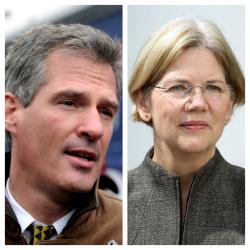BROOKE GLADSTONE: This is On the Media. I’m Brooke Gladstone. And now for something completely different: In January, Massachusetts Senator Scott Brown and his Democratic challenger, Elizabeth Warren, agreed to “the People’s Pledge,” a voluntary enforcement scheme designed to banish Super PAC and special-interest advertising from their campaigns. The deal does like this: if an outside group runs a spot, the candidate who benefits from that ad promises to donate half the ad’s cost to a charity of the opposing candidate’s choice. To the amazement of campaign-watchers everywhere, thus far, it has worked. John Carroll, a mass mommunications professor at Boston University has been following the campaign. John, welcome to On the Media.
JOHN CARROLL: Nice to be here.
BROOKE GLADSTONE: The race is neck in neck, and anywhere else in the country you’d be seeing wall-to-wall Super PAC ads. Is this Pledge making a difference in Massachusetts?
JOHN CARROLL: It is making a difference in a number of different ways. One is that there’s more money going to the campaigns, because anyone who wants to support either Brown or Warren, who otherwise could give money to a Super PAC, is really restricted to giving money directly to the campaign. So that’s one thing.
BROOKE GLADSTONE: Mm-hmm.
JOHN CARROLL: The other thing is that there’s not as much smash -mouth advertising on the air as there is –
[BROOKE LAUGHING]
- as there is in other states.
BROOKE GLADSTONE: The ones where the color bleaches out and there’s a dramatic base note.
JOHN CARROLL: No, they’re missing. For instance, there was a rumpus here about Elizabeth Warren’s Native American heritage and whether she actually had Native American heritage or not. Scott Brown can’t go after Elizabeth Warren on that topic. He just can’t do it.
BROOKE GLADSTONE: The charge was that she was exaggerating her Native American background.
JOHN CARROLL: Right, that she had fabricated it, actually, and, and – and had used it to her advantage, to her professional advantage in the academic world. Now, if third party ads were running here in the state you can imagine what Carl Rove’s group Crossroads GPS might do with that topic. But they haven’t, so it’s been left to the Boston Herald to whack Elizabeth Warren around as much as possible on that topic.
But Scott Brown is in this sort of delicate position where he can’t really go negative without risking blowback. You know, Scott Brown has always built himself as an independent voice. He’s someone who doesn’t want to be beholden to the interest groups associated with the Republican Party. Elizabeth Warren, I mean, this plays into her image as a “goo-goo.” She’s basically a good government type. So I think both of them, it plays to their strengths as candidates to stick with this Pledge.
BROOKE GLADSTONE: How do you think this is gonna end?
JOHN CARROLL: Okay, so there are two schools of thought here. One is that if a wide enough lead opens up between the two candidates, the one who is trailing will have third party groups coming in to help them close that gap. The second school of thought is that this will survive because the candidates will be afraid to break it, will be afraid to alienate the public and that they have enough money to wage a robust campaign without the third party groups coming in.
So I think a lot of it is going to happen after Labor Day, and a lot’s gonna be determined by whether this race stays tight or this race opens up and makes one candidate desperate enough to break the Pledge.
BROOKE GLADSTONE: That one candidate, I assume, would be Scott Brown because there’s so much more Super PAC money behind the Republicans.
JOHN CARROLL: The Democratic Super PACs have pretty much lunch money compared to the Republicans.
BROOKE GLADSTONE: Mm-hmm.
JOHN CARROLL: So what you have is a situation where Scott Brown would be hugely advantaged by this Pledge being broken, but I’m not sure that he wants to run the risk of being the one to break it.
BROOKE GLADSTONE: And you think the public will care?
JOHN CARROLL: I think the public cares about this Pledge the same way the public says they watch a lot of public television.
[BROOKE LAUGHS]
I think that in theory they like it, but if it went away they would grumble about the ads but I don’t think there would be any permanent damage.
BROOKE GLADSTONE: Do you think that the People’s Pledge could gain steam elsewhere?
JOHN CARROLL: Other candidates are going to look at the situation in Massachusetts and think this will never be a sort of even-Steven deal. One candidate, one campaign is going to be disadvantaged by this in almost every case. And so, for that reason, I think that most candidates will stay away from it.
BROOKE GLADSTONE: So if you think a likely scenario is Carl Rove’s Crossroads Super PAC moving in at some point, what would you wager?
JOHN CARROLL: If I’m betting with my money, I think that I would probably hedge my bet a little bit. I think that there is a chance that this Pledge will survive all the way to Election Day. I think that there are many factors that could make it fall apart. There’s only one real factor that keeps it together, which is the candidates protecting their images.
BROOKE GLADSTONE: John, thank you very much.
JOHN CARROLL: My pleasure.
BROOKE GLADSTONE: John Carroll is a professor of mass communications at Boston University.

